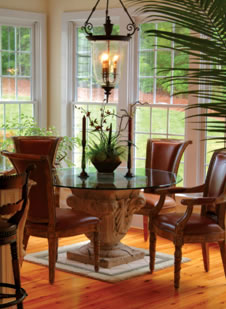YOUR HOME - INTERIOR LOOKS
Making your Home Safe
Is Cleaning your Home making you Sick?
June, 2006 - Issue #20
 |
While there are multiple causes for poor home air quality (think mold and other biological pollutants; radon gas; pesticides; carbon monoxide; formaldehyde found in carpets, drapery, plywood paneling and more), household products traditionally touted for convenience can also introduce harmful chemicals into your house.
Product exposure, especially those containing compounds that evaporate easily into the air, can lead to headaches, eye, nose and throat irritation, dizziness and more, and the effects can be felt by some even when the products are in storage and not actively in use.
Easy-to-incorporate quick-fixes include common sense adjustments like tightening the lids on household cleaning products, keeping the home well-ventilated both during and after the use of chemical cleaners, and avoiding the use of toxic products when possible.
If you're ready to take the next step and ditch your chemical-laden cleaning solutions for a more natural, healthy alternative (both for your family and the environment), consider replacing store-bought products with the following items and mixtures.
To freshen your home's air without spraying chemical cover ups, add a few more houseplants into the mix. For more immediate results, sprinkle baking soda on your carpets. After a few minutes, vacuum up both the powder and any lingering scents. To remove tough smells from cutting boards, counters, utensils and the like, wipe the items with vinegar and then clean them with soapy water. For clogged, stinky drains, pour one-half cup of baking soda down the drain, then follow it with one-half cup vinegar. The reaction will break down fatty deposits and clear out smells. After 15 minutes, pour boiling water down the drain to flush out remaining residue.
| "Household products traditionally touted for convenience can also introduce harmful chemicals into your house. This toxic environment can lead to allergies, sinus problems, frequent cough, asthma irritation - even cancer." |
For a simple all-purpose cleaner, mix one-half cup vinegar, a quarter-cup baking soda and one-half gallon water. The mixture can be stored and used to clean windows, mirrors, chrome fixtures, water deposit stains and more.
Regular household items can be used to replace multiple cleaners. Instead of relying on harsh chemicals or expensive wipes to disinfect counters, consider using store-bought alcohol. To remove grease, mildew, and even wax build-up, use white vinegar. Scour and whiten sinks, bathtubs and more with baking soda.
Popular-use toilet bowl cleaners contain harsh chemicals. A combination of a quarter-cup baking soda and one cup of vinegar, left to soak in the basin for a few minutes before scrubbing, should do the trick in most cases. For tougher jobs, straight bleach can be poured into the basin and left to soak - just don't mix the bleach with anything but water, or you're in for an undesirable science experiment.
If making your own cleaners seems a little bit too Woodstock for you, consider purchasing non-toxic cleaners. Many companies produce healthier alternatives. Some options include Howard Naturals, Moran Jane, Sun and Earth and Soapworks. Purchasing a steam cleaner will also cut down on chemical usage and will simultaneously disinfect your home.
For more information on indoor air quality, visit informative websites like www.epa.gov or www.lungusa.org.
|
||||||||||||||||||||||||||||




